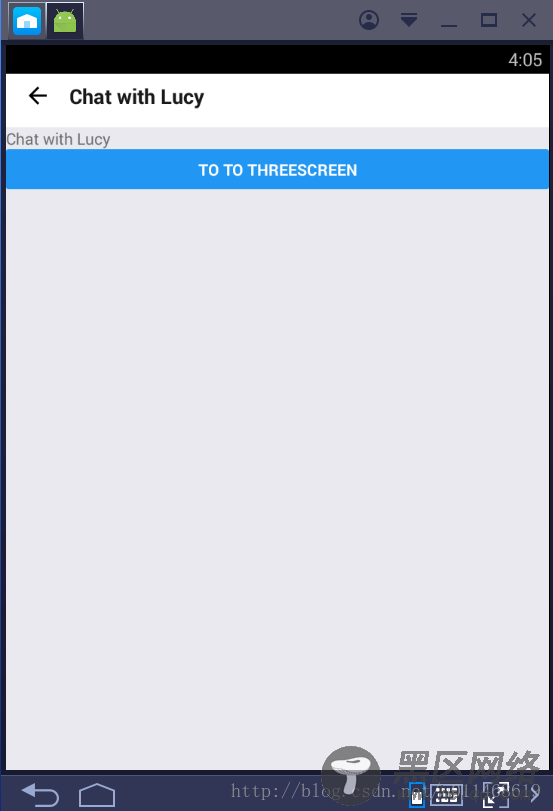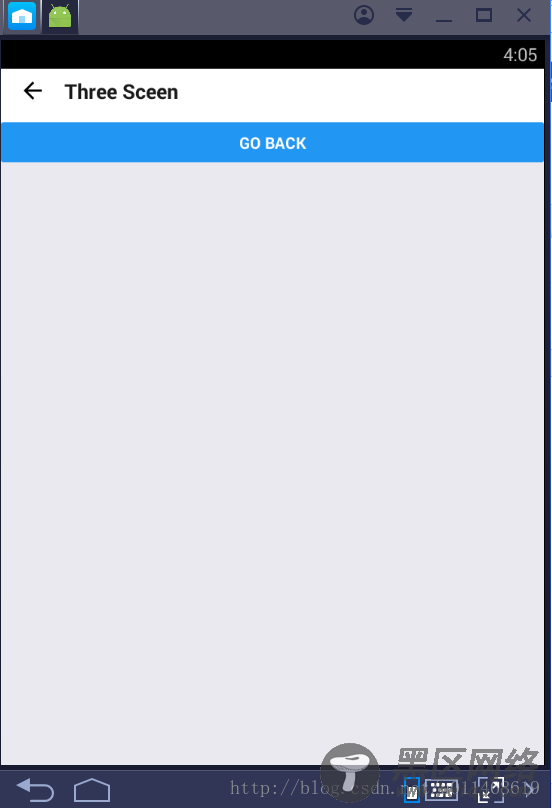首先要确认已经配置好react-native的环境。
# 创建一个native应用,SimpleApp,然后进入项目目录 react-native init SimpleApp cd SimpleApp # 通过npm安装最新版本的react-navigation npm install --save react-navigation # 运行程序 react-native run-android
引入Stack Navigator
对于我们的应用程序,我们想要使用堆栈式导航器,因为我们想要一个概念的“堆栈”导航,其中每个新屏幕都放在堆栈顶部,然后从堆栈顶部移除一个屏幕。
import React from 'react'; import { AppRegistry, Text, } from 'react-native'; import { StackNavigator } from 'react-navigation'; class HomeScreen extends React.Component { static navigationOptions = { title: 'Welcome world', }; render() { return <Text>Hello, Navigation!</Text>; } }
const SimpleApp = StackNavigator({ Home: { screen: HomeScreen }, }); AppRegistry.registerComponent('SimpleApp', () => SimpleApp);
屏幕的title在静态导航选项中是可配置的,在这里可以设置许多选项来配置导航器中的屏幕显示。
添加一个新的屏幕
class ChatScreen extends React.Component { static navigationOptions = { title: 'Chat with Lucy', }; render() { return ( <View> <Text>Chat with Lucy</Text> </View> ); } }
然后在HomeScreen添加一个按钮,链接到ChatScreen
class HomeScreen extends React.Component { static navigationOptions = { title: 'Welcome', }; render() { const { navigate } = this.props.navigation; return ( <View> <Text>Hello, Chat App!</Text> <Button onPress={() => navigate('Chat')} title="Chat with Lucy" /> </View> ); }
最后将添加的两个页面添加到StackNavigator中
const SimpleApp = StackNavigator({ Home: { screen: HomeScreen }, Chat: { screen: ChatScreen }, });
在这里,可以传递参数,从HomeScreen传递
class HomeScreen extends React.Component { static navigationOptions = { title: 'Welcome', }; render() { const { navigate } = this.props.navigation; return ( <View> <Text>Hello, Chat App!</Text> <Button onPress={() => navigate('Chat', { user: 'Lucy' })} title="Chat with Lucy" /> </View> ); } }
ChatScreen接收参数
class ChatScreen extends React.Component { // Nav options can be defined as a function of the screen's props: static navigationOptions = ({ navigation }) => ({ title: `Chat with ${navigation.state.params.user}`, }); render() { // The screen's current route is passed in to `props.navigation.state`: const { params } = this.props.navigation.state; return ( <View> <Text>Chat with {params.user}</Text> </View> ); } }
添加第三个页面,Three.js, ChatScreen跳转到Three
import React,{Component} from 'react'; import { AppRegistry, Text, View, Button, } from 'react-native'; class Three extends React.Component { static navigationOptions = { title: 'Three Sceen', }; render() { const { goBack } = this.props.navigation; return ( <Button title="Go back" onPress={() => goBack()} /> ); } } export default Three;
修改ChatScreen的配置
class ChatScreen extends React.Component { static navigationOptions = { title: 'Chat with Lucy', }; render() { const { navigate } = this.props.navigation; return ( <View> <Text>Chat with Lucy</Text> <Button onPress={() => navigate('Three')} title="to to ThreeScreen" /> </View> ); } }
最后的结果如下:



最后给出完整代码
文件 index.android.js
import SimpleApp from './App';
文件App.js
import React from 'react'; import { AppRegistry, Text, View, Button, } from 'react-native'; import { StackNavigator } from 'react-navigation'; import ThreeScreen from './Three.js'; class HomeScreen extends React.Component { static navigationOptions = { title: 'Welcome', }; render() { const { navigate } = this.props.navigation; return ( <View> <Text>Hello, Chat App!</Text> <Button onPress={() => navigate('Chat')} title="Chat with Lucy" /> </View> ); } } class ChatScreen extends React.Component { static navigationOptions = { title: 'Chat with Lucy', }; render() { const { navigate } = this.props.navigation; return ( <View> <Text>Chat with Lucy</Text> <Button onPress={() => navigate('Three')} title="to to ThreeScreen" /> </View> ); } } const SimpleApp = StackNavigator({ Home: { screen: HomeScreen }, Chat: { screen: ChatScreen }, Three: { screen: ThreeScreen}, }); AppRegistry.registerComponent('SimpleApp', () => SimpleApp);
文件Three.js
